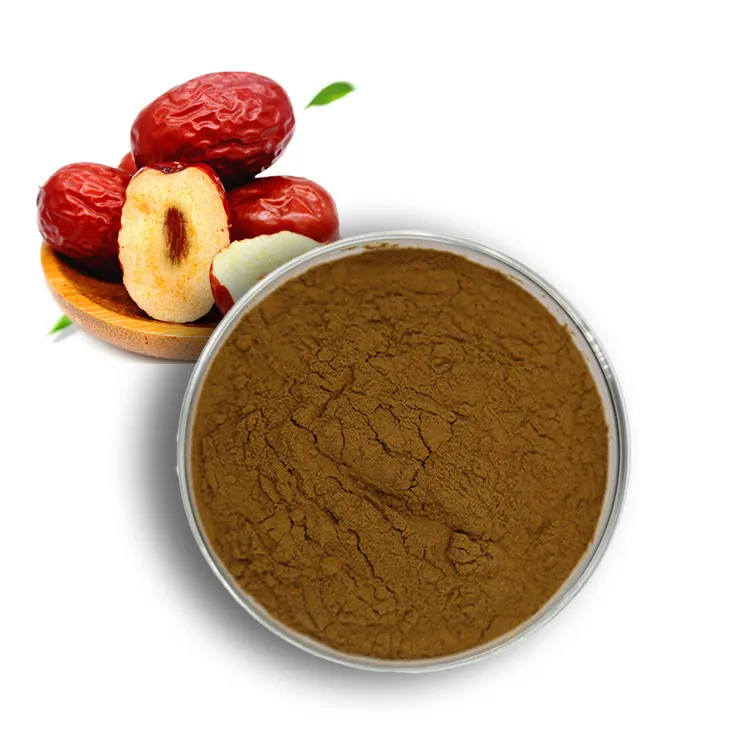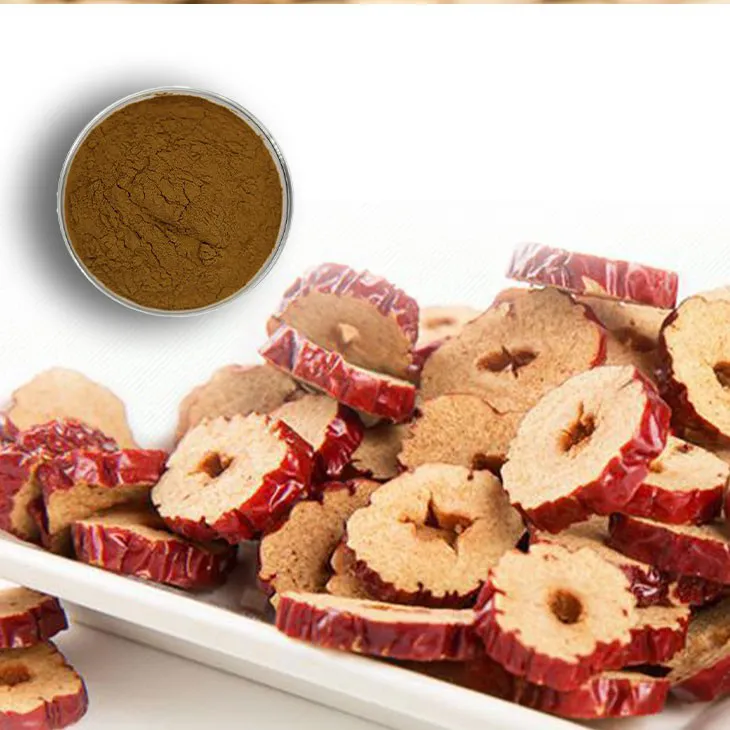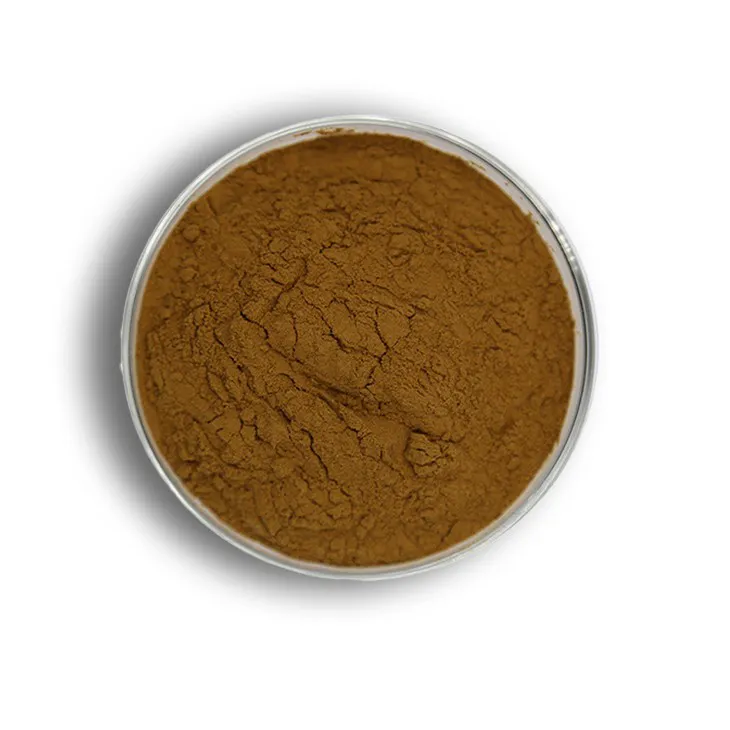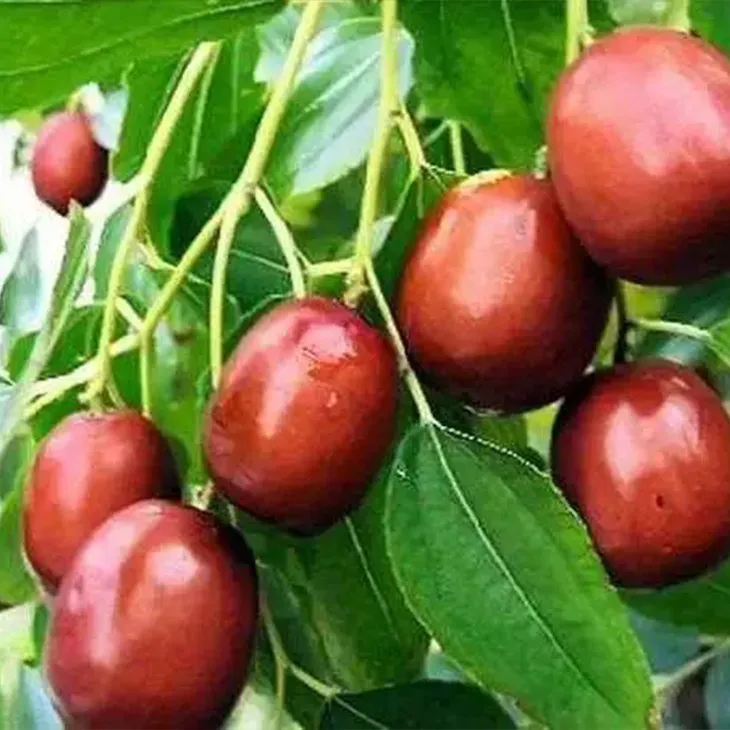- 0086-571-85302990
- sales@greenskybio.com
What are jujube extracts? Definition, types, history and nutritional value.
2024-12-10

1. Definition of Jujube Extracts
Jujube Extract is a substance obtained through various extraction methods from jujubes. Jujubes, also known as Chinese dates, are the fruits of the Ziziphus jujuba tree. The extraction process aims to concentrate the active components present in the jujube fruit. These extracts can be in the form of powders, tinctures, or concentrated liquids. They are used in a variety of applications, including in the food, pharmaceutical, and cosmetic industries.

2. Types of Jujube Extracts
2.1 Oleanolic Acid - type Triterpenoid Extract
Oleanolic acid - type triterpenoid extract is one of the important types of jujube extracts. Oleanolic acid is a natural compound with multiple biological activities. In jujube extracts, this type of triterpenoid has been found to possess antioxidant properties. Antioxidants are crucial for the body as they help in combating oxidative stress. Oxidative stress is associated with various diseases such as cancer, heart diseases, and neurodegenerative disorders. The oleanolic acid - type triterpenoid extract from jujube can scavenge free radicals in the body, thus protecting cells from damage.
2.2 Cyclic AMP - related Extracts
Cyclic AMP (cAMP) is an important signaling molecule in the body. In jujube extracts, components related to cyclic AMP have been identified. These extracts are believed to play a role in regulating various physiological processes. For example, they may be involved in cell communication and the modulation of enzyme activities. Studies have suggested that cAMP - related extracts from jujube could potentially have an impact on the immune system. They might enhance the body's immune response by influencing the function of immune cells such as lymphocytes and macrophages.

3. History of Jujube Utilization
The history of jujube utilization dates back thousands of years. Jujubes have been an important part of traditional medicine in many Asian countries, especially in China. In ancient Chinese medicine, jujubes were used to treat a variety of ailments. They were often prescribed for issues related to digestion, such as stomach discomfort and diarrhea. Jujubes were also considered to have a tonic effect on the body, helping to strengthen the spleen and stomach, according to traditional Chinese medical theory.
Moreover, jujubes were not only used for medicinal purposes but also as a food source. They were dried and stored for long - term use. Dried jujubes were a common ingredient in traditional Chinese cuisine, used in making soups, desserts, and various traditional snacks. Over time, the knowledge of jujube's beneficial properties spread to other parts of the world. With the development of modern extraction techniques, the utilization of jujube has extended to the extraction of its active components, leading to the production of jujube extracts.

4. Nutritional Value of Jujube Extracts
4.1 Dietary Fiber
Jujube extracts are rich in dietary fiber. Dietary fiber is essential for maintaining a healthy digestive system. It adds bulk to the stool, preventing constipation. Fiber also helps in regulating blood sugar levels by slowing down the absorption of carbohydrates. In addition, it can contribute to reducing cholesterol levels in the blood. Soluble fiber in jujube extracts can bind to cholesterol in the digestive tract and prevent its absorption into the bloodstream.
4.2 Vitamins
Jujube extracts contain various vitamins, with the vitamin B complex being a notable component. Vitamins in the B complex, such as thiamine (B1), riboflavin (B2), and niacin (B3), play vital roles in the body's metabolism. Thiamine is necessary for the proper functioning of the nervous system and for converting food into energy. Riboflavin is involved in energy production and maintaining healthy skin and eyes. Niacin helps in the digestion, absorption, and utilization of food.
4.3 Phytonutrients
Jujube extracts are also a source of phytonutrients. These are plant - based compounds that have various health - promoting effects. Phytonutrients in jujube extracts have anti - inflammatory properties. Inflammation is a natural response of the body to injury or infection, but chronic inflammation can lead to many diseases. The anti - inflammatory phytonutrients in jujube extracts can help in reducing inflammation in the body. They may also have antioxidant effects, protecting cells from damage caused by free radicals.

5. Applications of Jujube Extracts
5.1 In the Food Industry
Jujube extracts are used in the food industry as natural flavorings and sweeteners. They can add a unique flavor to food products, such as baked goods, beverages, and confectionery. Due to their nutritional value, they can also be used to enhance the health - promoting properties of functional foods. For example, jujube extract - fortified foods can be marketed as products that support digestion or boost the immune system.
5.2 In the Pharmaceutical Industry
In the pharmaceutical industry, jujube extracts are being studied for their potential therapeutic effects. Their antioxidant, anti - inflammatory, and immune - enhancing properties make them candidates for the development of new drugs or dietary supplements. For example, extracts may be formulated into tablets or capsules for people with digestive disorders or those who need immune support.
5.3 In the Cosmetic Industry
The antioxidant and anti - inflammatory properties of jujube extracts also make them useful in the cosmetic industry. They can be incorporated into skincare products such as creams, lotions, and serums. Jujube extract - based cosmetics may help in reducing skin inflammation, improving skin elasticity, and protecting the skin from oxidative damage. This can lead to healthier - looking skin with reduced signs of aging.
6. Conclusion
Jujube extracts are a valuable natural resource with a wide range of potential applications. Their diverse types, rich history, and significant nutritional value make them an interesting area of study and development. As research continues, we can expect to see more applications of jujube extracts in various industries, bringing more health and beauty benefits to consumers.
FAQ:
What is jujube extract?
Jujube extract is a concentrated form of components from jujube.
What are the common types of jujube extracts?
The common types are oleanolic acid - type triterpenoid extract and cyclic AMP - related extracts.
What is the history of jujube in human utilization?
Jujube has a long - standing history in human utilization.
What are the nutritional values of jujube extract?
Jujube extract is full of nutrients. It has a significant amount of dietary fiber which aids in digestion, as well as various vitamins such as vitamin B complex that play crucial roles in metabolism, and phytonutrients with anti - inflammatory effects.
How does the dietary fiber in jujube extract help?
The dietary fiber in jujube extract aids in digestion.
Related literature
- Nutritional Components and Health Benefits of Jujube Extracts"
- "A Review on the Types and Properties of Jujube Extracts"
- "The Historical and Modern Significance of Jujube in Human Nutrition"
- ▶ Hesperidin
- ▶ Citrus Bioflavonoids
- ▶ Plant Extract
- ▶ lycopene
- ▶ Diosmin
- ▶ Grape seed extract
- ▶ Sea buckthorn Juice Powder
- ▶ Fruit Juice Powder
- ▶ Hops Extract
- ▶ Artichoke Extract
- ▶ Mushroom extract
- ▶ Astaxanthin
- ▶ Green Tea Extract
- ▶ Curcumin
- ▶ Horse Chestnut Extract
- ▶ Other Product
- ▶ Boswellia Serrata Extract
- ▶ Resveratrol
- ▶ Marigold Extract
- ▶ Grape Leaf Extract
- ▶ New Product
- ▶ Aminolevulinic acid
- ▶ Cranberry Extract
- ▶ Red Yeast Rice
- ▶ Red Wine Extract
-
Aguaje Extract
2024-12-10
-
Withania Somnifera Extract
2024-12-10
-
Shikone Extract
2024-12-10
-
Nettle Root Extract
2024-12-10
-
Phyllanthus Emblica Extract
2024-12-10
-
Sophora Flavescens Root Extract
2024-12-10
-
Artichoke Extract
2024-12-10
-
Grape Seed Extract
2024-12-10
-
Black Garlic Extract
2024-12-10
-
Black Rice Extract
2024-12-10





















